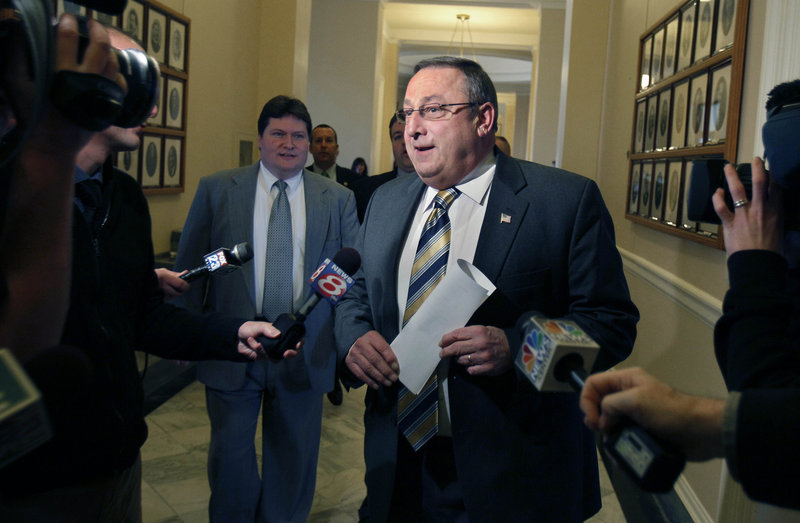A word of advice for those of you who feared that Gov. Paul LePage would show up for his first full day of work Thursday with absolutely no idea what to do next.
Relax. He has at least one.
“You’re going to find me very passionate about this program,” LePage told 5,000-plus cheering supporters during his invitation-only inaugural speech on Wednesday. “I believe we need to create a five-year high school program in Maine where students can graduate with an associate’s degree as a heads-up in going into the workforce or as credit toward a four-year degree at the university or college level.”
It was, to be sure, the only nugget of concrete in a speech long on where Maine needs to go but noticeably short on how we’re going to get there.
Better yet, at a time when too many Maine kids are checking out of the education system immediately after receiving their high school diplomas (if not sooner), the concept of using college credit as a carrot to keep them around actually makes sense.
But getting it done?
Welcome, Gov. LePage, to the heavy lifting.
Thursday morning, Maine Community College System President John Fitzsimmons got on the horn with Stephen Bowen, LePage’s senior policy advisor for education.
It was, Fitzsimmons later explained, a “preliminary discussion” of what it’s going to take to design and build a bridge across the economic chasm that now separates a high school diploma from a post-secondary degree.
“It’s a very exciting discussion,” a tactful Fitzsimmons later said. “But the details are challenging.”
Echoed Bowen in an interview from the State House, “The only way to do it is to get everyone around the table.”
Fitzsimmons, much to his credit, didn’t just wait for this to land on his desk the day after LePage’s swearing-in. Shortly after November’s election, he put together a “design team” within the community college system to at least start researching LePage’s concept of “five-year high schools” and how it might be implemented in a small, rural state like Maine.
The group found that 20 states now have some type of five-year high school plan through which students earn diplomas while racking up college credit. But almost all, Fitzsimmons said, are tiny pilot programs encompassing no more than a half-dozen or so schools.
“The largest in the nation is North Carolina, with 70,” Fitzsimmons said. “What you should know, though, is that North Carolina began with a $21 million grant from the Gates Foundation and each year the legislature allocates $19 million for those new ‘early colleges.’“
In other words, this kind of thing, especially when envisioned full-scale across sprawling Maine, ain’t going to come cheap.
“I think we can design something that will match up with where the governor would like us to go,” Fitzsimmons said. “But the models I’ve seen, frankly, are just too expensive for a state that’s struggling with a tough economy.”
Translation: LePage’s passion notwithstanding, this pet project is far from even taking shape — let alone being declared a done deal.
A few pivotal questions:
When and where will the high school kids who sign onto the five-year plan actually take their college-level courses?
And if some or all of those courses are offered in Maine’s 138 public high schools, who’s going to teach them?
And, last but by no means least, who’s going to pay for those “free” courses? The cash-strapped state? The already mad-as-hell local taxpayer?
“You’re absolutely, unequivocally right at the heart of the issue,” Fitzsimmons said. “That is the dialogue we need to have with the new administration — what the direction is.”
Bowen, LePage’s point man on education, acknowledged that it’s way too soon to know where this thing is headed. The only legislation contemplated for this session, he said, might call for the creation of a “stakeholders group” to come up with an actual blueprint.
“It’s an idea that intrigued the governor,” Bowen said. “He’s very interested in it and thought it had a lot of promise. My job is to make it happen.”
Here’s hoping he succeeds. As Fitzsimmons noted, only 37 percent of Maine’s adults hold post-secondary degrees, compared with 46 percent throughout New England.
In other words, he said, “we’ve got to have 30,000 more degree holders to get up to the New England average.”
At the same time, the Maine Community College System’s 100 or so occupational programs have a 4,000-person waiting list, reflecting a system that already can’t keep up with what Fitzsimmons calls the “pent-up demand to get into the very occupations that are tied to Maine’s economy.”
“The governor’s right,” Fitzsimmons said. “We’re going to need more people with college degrees and we’re going to have to find a way to finance that and make it work.”
So congratulations on your first big idea, Gov. LePage.
And good luck with your base when they realize what it takes, alas, to turn a good-but-complicated idea into simple reality.
It’s called “state spending.”
Columnist Bill Nemitz can be contacted at 791-6323 or at:
bnemitz@mainetoday.com
Send questions/comments to the editors.



Success. Please wait for the page to reload. If the page does not reload within 5 seconds, please refresh the page.
Enter your email and password to access comments.
Hi, to comment on stories you must . This profile is in addition to your subscription and website login.
Already have a commenting profile? .
Invalid username/password.
Please check your email to confirm and complete your registration.
Only subscribers are eligible to post comments. Please subscribe or login first for digital access. Here’s why.
Use the form below to reset your password. When you've submitted your account email, we will send an email with a reset code.